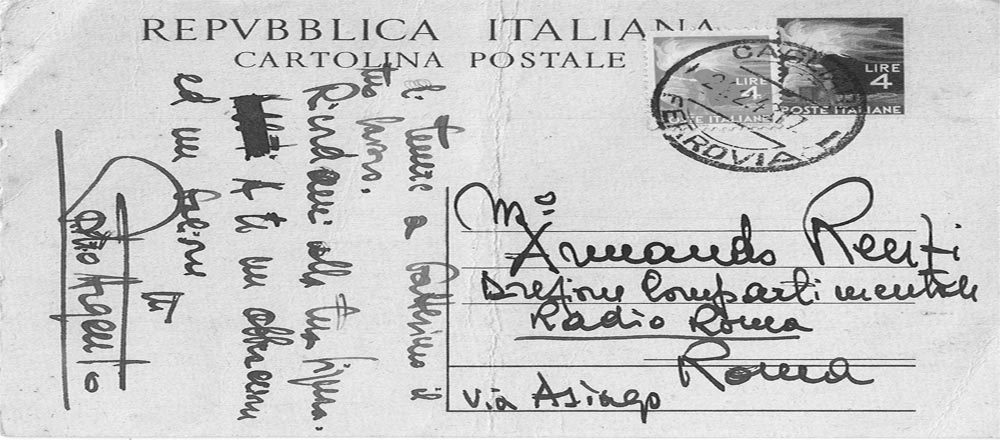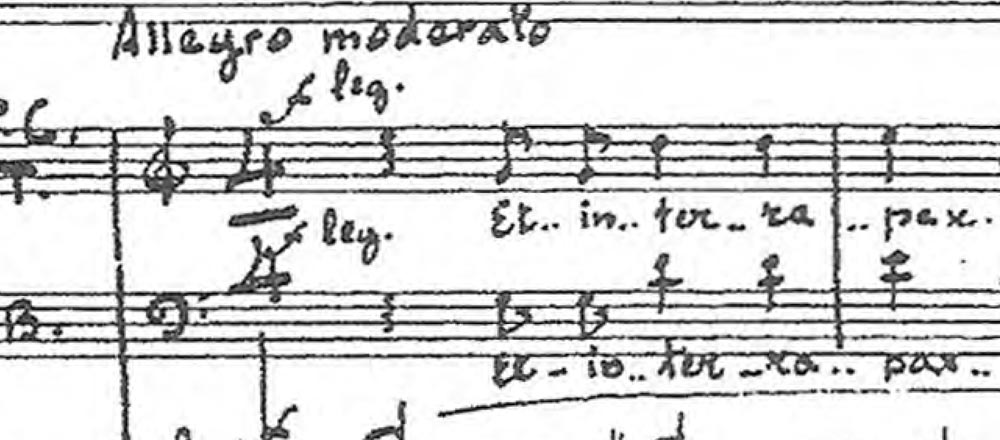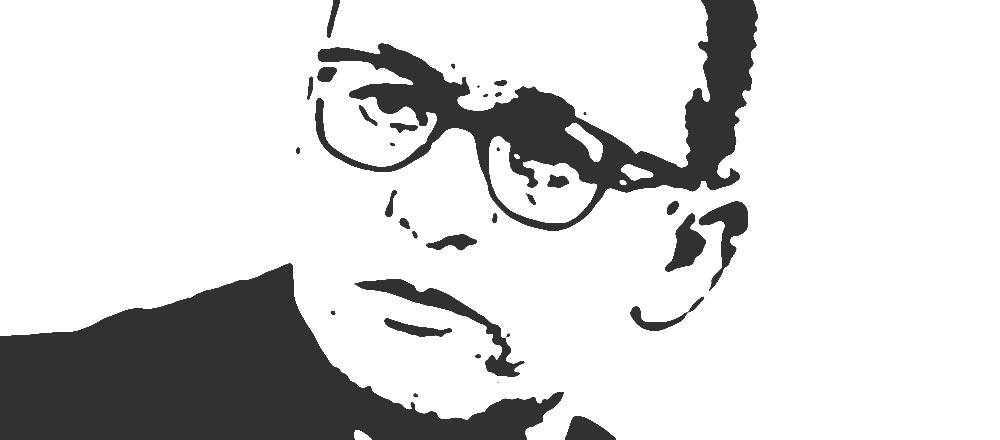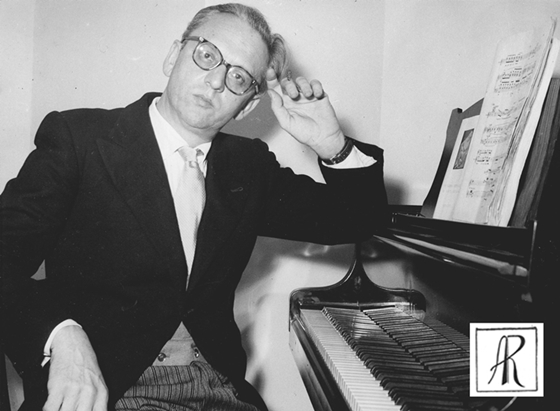Portraits
Valentino Miserachs Grau
At the time of my enrollment at the Pontifical Institute of Sacred Music in 1947, I was assigned to the composition class of Maestro Armando Renzi; and soon after i realized what a great chance that had been for me, one of those chances that changes your life. Renzi would very generously infuse all his endless music knowledge into the soul of an intelligent pupil, and his human warmth was such that to his students he was not only the teacher but also a father figure and a friend. “If a student would ever surpass me – quite difficult! – I couldn’t be happier about it” he told me. Nevertheless, how could one outdo such a gifted, educated and extremely versatile musician?
Elisabetta Renzi
There are several memories that I have of my grandfather, at that time all of us cousins feared him quite a bit...
The “bear”, of whom we imagined the worst possible things, after a few years since my decision to take music seriously and become a professional cello player, became my teacher for composition, harmony, counterpoint, etc.
The speed at which he conveyed his music teaching was impressive, it was clear that I was not used to his timing...
He became aware of that and patiently guided me by hand along the road ahead of me in music.
Bruno Moretti
The first word that comes to mind when I remember Maestro Renzi is “clarity”, the clarity that he expected of his students already in the first harmony and counterpoint assignments, the clarity that he chased during a time in history that had very little clarity. I often wonder how now, after so many years, he would have reacted to some radical changes which he did not get to witness and that have drastically changed our perception of things. I wonder if he would have ever given in to having a cell phone or a computer and I smile while imagining his ironic and disenchanted comments to the frantic novelties of our times.
Giovanni Piazza
I can wholeheartedly say that it was an encounter with Maestro Armando that shifted my composition studies from the level of technique to that of music, from theory to creation. For me, at the time very much trapped in a reserved and apprehensive personality, filled with insecurities and perplexities, my encounter with him was foremost an incentive to discover my potential and to enhance it. Due to my inclination to learn by experience rather than by abstract speculation, it was a real godsend, for the quick completion of my composition studies, the quantity of direct creative impressions that the Maestro so generously offered.
Vincenzo Borgia
When I look at the past, there is prestigious character in my memory: Maestro Armando Renzi, a musician of elevated artistic value, and human as well, one who put his humanity at my disposal, who advised me, taught me the real values of life, as usually only a father would do, who has shaped me professionally and for whom I have a feeling of profound gratitude. It has been an immense honor to have met him and shared with him so many moments of my life.
Thank you Maestro!Gian Paolo Chiti
I met Armando Renzi for the first time in May 1946 when I was seven years old. On that occasion, the Maestro heard me play classical pieces at the piano and some of my compositions too. He right away wanted me as his student. My father, who accompanied me, told him that he would not have been able to pay for the lessons (they were difficult years!). Nevertheless, Renzi accepted to teach me anyway, generously free of charge. Therefore, I studied for three years piano and solfeggio with him.
Lucio Liviabella
Dear Dottoressa Renzi,
What a pleasure to receive your email! I remember accompanying the Maestro from his hotel to the Teatro Comunale in Bologna. I have the wonderful recording of the Tre Momenti for viola and piano by my father, Lino Liviabella, with the violist Dino Asciolla. Maestro Renzi, in several concerts with the Radio Roma Trio, performed the one movement Trio also by my father.
G. B. Salvatori
Armando Renzi, the last great true “musician” of the glorious Roman School.
He only had one shortcoming: he was not a “salesman”, as many others.
I am gladly at your disposal so that the Pianist, the Composer, the Conductor of both orchestra and Choir, the generous teacher, the Academic of Santa Cecilia can be remembered.
Daniela Morelli
“My husband, the conductor Cesare Croci and I, Daniela Morelli, pianist and teacher at the Conservatory Santa Cecilia of Rome, were both fond pupils of Maestro Armando Renzi. My father Guglielmo Morelli, violist, and the Maestro knew each others since childhood. I met him when I was very young and for many years, along with my husband, he guided us on the road of music art with passion, love, energy and joy, the way he only knew how. All the musical Rome of the time moved around the figure of the Maestro, genious composer and pianist. Everyone wanted his teaching and he gave and told everything about music to us devoted students.Thank you Maestro.”
Massimo De Lillo
My father, Ottavio De Lillo, has been Composer and Teacher at the Conservatory “N. Piccinni” at Bari, where in 1970 he began studying Composition under Maestro Armando Renzi.
Renzi was pivotal in Ottavio’s training, as he profoundly inspired his lifestyle and music making.
For this reason, in my book about Maestro Ottavio De Lillo “Quando la musica riconcilia con il mondo”, ten years after his passing, I decided to dedicate a chapter to Maestro Armando Renzi, which I have asked Maestro V. Miserachs to write.
Luciano Michelini
Maestro Armando Renzi was one of the most complete and genial musician of 1900.
Pianist, Composer and Conductor, in each of these disciplines he poured his inexhaustible genius.
His work method was Renaissance style, he slept very little and already by dawn, he was at the piano or at his seat composing, often writing in standing position like the ancient scribes.
He was Maestro Emeritus at the Giulia Chapel in the Vatican and each day he was to compose the principal vespers, motets and masses for the liturgical services.
As a teacher, he was a beacon to the numerous students whom he guided in his life, including myself.
Gerardo Urbán Velasco
I remember with great pleasure my dear friend Maestro Armando Renzi, in my opinion one of the greatest musicians worldwide.
I will share three stories out of the many, which I went through with my composition teacher.
On one occasion, during a Counterpoint and Fugue class at the Conservatory “Alfredo Casella” at L’Aquila, so he could to better explain to me the concepts related to the fugue, he asked me for a theme. Knowing the Maestro’s virtuosity in these disciplines, I offered a syncopated theme. He played it and began the exposition going on in incredible way by improvising at the piano a complex fugue, without any error at all. How great you are, Maestro Renzi!
Franco Piersanti
What I am about to write here about Armando Renzi, my Music teacher, is not only a simple memory nor an account of affection and unlimited admiration for the man and musician that he was, but an authentic declaration of gratitude to him because, having had the fortune of being next to him and feeling close to him during my music training years, he gave a sense of direction to my life and the music career that followed.
Giovanni Sorrentino
Preparation to the Composition Degree at the Conservatory of Music Santa Cecilia in Rome, (1967), under the guidance of Maestro Armando Renzi.
His personality, ever since our first encounter, was fascinating and encouraged me quite a bit, because rather than only assigning already known themes of Sonatas, Quartets, Overtures and so on, he suggested that I prepared my own thematic material, and therefore provided me with the necessary hint to create a musical composition in its entirety.
Maurizio Furlani
Alas, many memories disappear and perhaps when life has filled the memory, spaces limit the recovery of gestures, words and facts that have consolidated my life.
When one lived in contact with people who donate, to their credit, part of human knowledge, one should keep that knowledge in order to then nurture it and share it back with future generations.
This happens to me often, to regenerate in order to donate, to repurpose a message while learning and deepening its concept.
Luigi Andrea Gigante
When one thinks of Maestro Renzi, the following comes immediately to mind: for the Artist – the passion and the thrill of the new, the perfection, almost unattainable, but particularly the poetry (one must “reach the poetry inherent in every thing“); for the Teacher – the extraordinary empathy, responsibility and generosity; for the Man – the inexhaustible energy, responsibility and human generosity. In short, a great personality, difficult to summarise in a few words.
In 1960, I had the great fortune to meet Maestro Armando Renzi. I had just returned to Italy from Munich (Carl Orff, Kurt Eichhorn and the Musikhochschule) to learn some writing styles which were required of us at some exams (such as Double Chorus and few other things), but at that time they were not taught in Germany, only analyzed, since they were considered merely of musicological interest.
In Rome, everybody recommended Maestro Renzi to me – whom I had also heard on the radio, years earlier, as a pianist.
I had never witnessed so many qualities, knowledge and competence all in one person. And I would never stop discovering them. I was to take the exam for the additional subjects of study for the organ class. Therefore Maestro Renzi himself, once he learned about the state of my studies, decided to help me up by suggesting a harpsichord maker where I could rent a mute pedal component so that I could practice a few hours daily for a few months. After the exam, Maestro Vignanelli, who presided the jury, asked me: “but you already play the organ, right?“
Once, he examined an ex-tempore assignment that he gave me: “you wrote a harmony from God!“, he repeated while playing it piece by piece. We then dove into the stuydy of Counterpoint, and so forth. A few months prior to the esam sessions, he trained me with the ‘sealed envelopes‘: he would give me in a sealed red envelope the theme that, as indicated on it, I had to extract on that a certain day at a certain time and complete by the time indicated. He wanted to know everything about it in order to advise me. As for the instrumentation, to which I had always paid rabid attention, he told me that it would be enough to practice a bit under Maestro Nino Rota’s instrumentator, Maetro Italo Delle Cese.
After graduation, he generously helped me gather all my documentation (I submitted as much as 15 employment applications all over Italy), as well as compiling all the papers.
Maestro, how could I ever thank you?
M° Luigi Andrea Gigante
November 1015

Homage to Armando Renzi at the Pontifical Institute of Sacred Music, Rome April 12, 2013
Video

Written accounts by Friends and Colleagues
Written accounts

Sacred Music Catalogue
S.I.A.E. (Italian Society Authors and Editors) Catalogue
Compositions

Memories from former students
Portraits
-
Luigi Andrea Gigante
When one thinks of Maestro Renzi, the following comes immediately to mind: for the Artist – the passion and the thrill… Read More -
Maurizio Furlani
My art teachers are all present in me but one in particular, Maestro Armando Renzi... Read More -
Robert Schumann
In F Sharp Minor Sehr Lebhaft
8 Novelletten Op.21
Soloist Armando Renzi
RAI Historical Archive 1957 Read More -
Armando Renzi
Valentino Miserachs GrauReligious March for organ
organ of the
Pontifical Institute of Sacred Music Read More
- 1
- 2
- 3
- 4
- 5
- 6
- 7
© 2025 armandorenzi.com
con la collaborazione tecnica di Roberto Diodati



